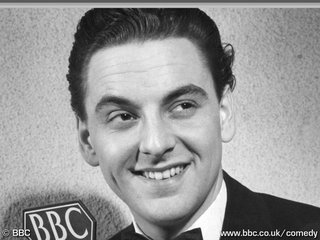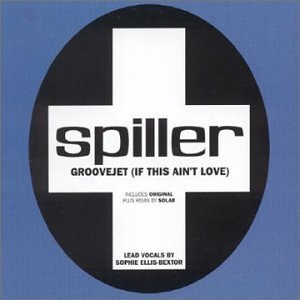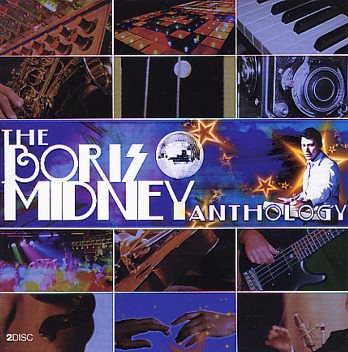Saturday, September 30, 2006
Suspicious Looking Device exists to incite unease
Kinda like me..:)

The Suspicious Looking Device is a bright orange box with a countdown timer on the top. If you touch it, it lets out a loud siren and then scoots away on a set of hidden wheels. Its entire purpose is to look suspicious - it has no other function. Check out a video here.

The Suspicious Looking Device is a bright orange box with a countdown timer on the top. If you touch it, it lets out a loud siren and then scoots away on a set of hidden wheels. Its entire purpose is to look suspicious - it has no other function. Check out a video here.
Friday, September 29, 2006
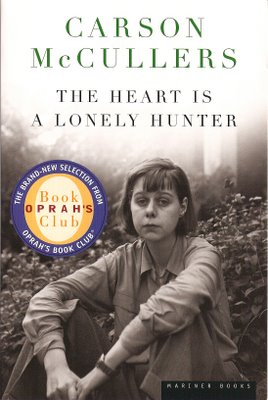
This book is simply outstanding. A friend recommended it to me yesterday when we were in Barnes and Noble and I bought it, despite it being in the Oprah Club. All I can say is WOW. What extraordinary depth and feeling and empathy and stirred passions. I mean, when I read a book like this, despite it's sad premise, it restores my faith in my own ability to feel things. It confirms to me that when I don't connect with 90% of the movies, books and people that I see/ read/ meet, it's because we, as people, do not have the ability to inspire, on a wide scale. If inspiration were more prevalent, perhaps it would be less inspiring, but you still miss it, on a day-to-day basis.
I'd never even heard of Carson McCullers, who died in 1967 at the age of 50. The astounding thing is she wrote this when she was twenty-three! You must read this book, if you get a chance. It's just wonderful and sad and poignant and brimming with tender energy. I've included some of the critic's quotes and , for once, they're not exaggerating.
"Like all writers of original genius, Miss McCullers convinces us that we have missed something which was plainly to be seen in the real world...she is a master of peculiar perception and an incomparable storyteller..a writer of the highest class."
V.S. Pritchett
"The most impressive aspect of [her work] is the astonishing humanity that enables a white writer, for the first time in Southern fiction, handle Negro characters with as much ease and humanity as those of her own race. This cannot be accounted for stylistically or politically; it seems to stem from an attitude toward life which enables Miss McCullers to rise above the pressures of her environment and embrace all humanity in one sweep of apprehension and tenderness."
Richard Wright
"Her genius for prose remains remains one of the few satisfying achievement of our second-rate culture."
Gore Vidal
Stone: 'I'm ashamed for my country'

SAN SEBASTIAN, Spain (AP) -- Filmmaker Oliver Stone blasted President George W. Bush Thursday, saying he has "set America back 10 years."
Stone added that he is "ashamed for my country" over the war in Iraq and the U.S. policies in response to the attacks of September 11.
"We have destroyed the world in the name of security," Stone told journalists at the San Sebastian International Film Festival prior to a screening of his latest movie, "World Trade Center." The film tells the true story of the survival and rescue of two policemen who were trapped in the rubble of the World Trade Center on September 11, 2001, after they went to help people escape.
"From September 12 on, the incident (the attacks) was politicized and it has polarized the entire world," said Stone. "It is a shame because it is a waste of energy to see that the entire world five years later is still convulsed in the grip of 9/11.
"It's a waste of energy away from things that do matter which is poverty, death, disease, the planet itself and fixing things in our own homes rather than fighting wars with others. Mr. Bush has set America back 10 years, maybe more."
The director of blockbusters such as "Platoon," and "JFK" said the U.S. reaction to the attacks was out of proportion.
"If there had been a better sense of preparation, if we had a leadership that was more mature," he said. "We did not fight back in the same way that the British fought the IRA or the Spanish government fought the Basques here. Terrorism is a manageable action. It can be lived with," said Stone.
Stone rejected allegations that U.S. authorities may have known about the attacks in advance and said the real conspiracy came after.
"I think that conspiracy-mongering on 9/11 is a waste of time," he said. "The far greater conspiracy occurred after 9/11 when basically a neo-cabal inside our government hijacked policy and went to war. That was as broad a conspiracy as we can get and it was about 20, 30 people. That's all, they took over and all these books are coming out and they are pointing it out," said Stone.
"This war on Iraq is a disaster. I'm disgraced. I'm ashamed for my country," he said. "I'm also ashamed that America has attacked itself with its constitutional breakdowns. I'm deeply ashamed."
In the United States' favor, Stone posited that it's not responsible for all the world's problems.
"You can't see that the United States is responsible for all the evil in the world because you can see so many dictators and so many bestial acts all over the world now. .... There is something in the human heart, the international human heart, that is evil," said Stone.
"That's the evil that turns its mind and ears on humanity and is able to say 'I can kill a person in the name of God or religion.' This is not a human being, this a fanatic. And I fear that fanaticism is the result of our overreaction to 9/11," said Stone.
Thursday, September 28, 2006
Land of the Sleestacks

Remember Land of the Lost? That show used to scare the shit out of me and my brother, especially when the T-Rex would chase them into their cave. They always ended up sticking a log in the T-Rex's throat. And don't even bring up the Sleestacks. Those bitches were terrifying!
I know I've been living in Queens too long when I begin to sound like a Queens GIRL.
Wednesday, September 27, 2006
Ladykiller by Lush

Here we go, I'm hanging out in Camden
Drinking with my girlfriends on a Saturday night
This guy says, "come and meet my girlfriend"
She's sitting in the corner looking rather uptight
So I say "hello" and I try to be nice
But I see he's feeling itchy
Trying to play us off each other
"Girls, girls, please don't fight"
(you get the picture)
Hey you, the muscles and the long hair
Telling me that women are superior to men
Most guys just don't appreciate this
You just try convincing me you're better than them
So he talks for hours 'bout his sensitive soul
And his favourite subject is sex
I don't think he even really wanted it
But, Christ, this guy's too much
(I wanna tell him)
I'm as human as the next girl,
I like a bit of flattery
But I don't need your practised lines,
your school of charm mentality so
Save your breath for someone else
and credit me with something more
When it comes to men like you,
I know the score, I've heard it all before
(Here comes the next one)
Blondie was with me for a summer
He flirted like a maniac
but I wouldn't bite
I'm weak and he was so persistent
He only had to have me
'cause I put up a fight
Oh God, the boy had such an ego
He liked to talk about himself
all day and all night
You think you're such a ladykiller
But you were nothing special
'til you turned out the light
When he's nice to me
he's just nice to himself
And he's watching his reflection
I'm a five foot mirror for adoring himself
Here's seven years' bad luck
(I wanna tell him)
When you say you love me
you're just flattering your vanity
But I don't need your practised lines,
your school of charm mentality so
Save your breath for someone else
and credit me with something more
When it comes to men like you, I know the score,
I've heard it all before
Ooh, you're such a ladykiller, always on a winner,
thinking that you're in there
Oh boy, you're such a ladykiller, super sexy mister,
call it what you will, oh
You think you're such a ladykiller,
I just bet you're still there,
posing in the mirror
Hey girls, he's such a ladykiller,
but we know where he's coming from
and we know the score.
The Version Suicides

What I hate about my job right now, what I hate about advertising in general, is the distinct lack of originality. You know, it's not even that, because originality is savored and appreciated. What's missing is the encouragement of original thought, on a day-to-day level as well as on a strategic planning of brand messaging.
For instance, most of my work is composed of a) versioning and b) adapting (which you could argue is a kind of versioning). So what is versioning, you may well ask, chickens? Versioning is a simple, innocuous enough task that a trained monkey with simple writing skills (for example, me) can do. It consists of taking an ad from another region, say the midwest, changing the tone to suit, say, the New York region. If there are phone numbers, these have to change as well. If there are references to MidWestern landmarks, local hangouts or customs, these have to change to.
There are other kinds of versioning too, besides geographical. For instance, we direct mail piece to a letter to a lawyer, trying to sell him/ her a Business DSL plan. Later, we have to version this letter out to Doctors, Accountants, Financial analysts, pimps, jizz-moppers and sanitation workers. We change the word we use for their business from "Practice" to "Firm" to "agency" to "whore house" as well as changing the benefits they can expect from buying our product/ service: "helps you create drafts in seconds, instead of minutes" becomes "allows you to access patient charts online, in a matter of minutes, which frees you up for the more important things". Presumably, a round of very expensive golf with your other asshole doctor friends. Versioning, my dear Holmes, can be applied to any segment of the market.
The reason we're asked to do versioning is because a) the ad worked in another market, so the assumption is that it'll work again in all markets, and b) economics.
If you ever have the misfortune to work in the corporate world and you hear the words "Leverage" or "Synergies" or "Applicable Model" or "Becoming more efficient", run a mile. All they mean is "We're going to stop coming up with original advertising and start versioning so we can save money - not because we need to or to save you having to work this hard, rather because we want to make a tidy profit so the board members can realise bigger dividends at the end of the year, which will drive up company stock that you will never own". So, our work becomes more homogenized, in step with the vanillafication of the rest of society. We contribute to it and it contributes to us. It's Adorno's 'Culture Industry' to a nightmarish degree and it is disgusting.
If you've never seen the short Truth in Advertising, watch it now. It's the reality of life in the ad business, and I'm not even a player. If I get this much crap at my level, how much worse is it at the top? I shudder at the thought.
Report: Owens attempted suicide
I knew he was depressed; you can't be that obnoxious without having something gnawing at you, inside. Pisses me off.
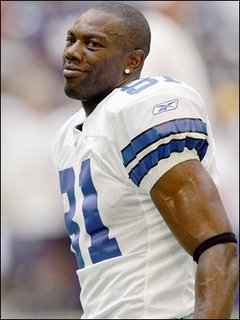
WFAA-TV in Dallas is reporting that Cowboys wide receiver Terrell Owens attempted to commit suicide Tuesday night.
According to a Dallas Police report obtained by the station, Owens was depressed and reportedly took prescription pain pills.
WFAA says the report states a woman companion said that she observed Owens putting two pills in his mouth. The woman said the prescription of 40 pills was filled on September 18 and -- until Tuesday -- Owens had taken only five pills. The police report said Owens was asked if he had taken the rest of the prescription; Owens said, "Yes."
The Dallas Cowboys have no comment on the story.

WFAA-TV in Dallas is reporting that Cowboys wide receiver Terrell Owens attempted to commit suicide Tuesday night.
According to a Dallas Police report obtained by the station, Owens was depressed and reportedly took prescription pain pills.
WFAA says the report states a woman companion said that she observed Owens putting two pills in his mouth. The woman said the prescription of 40 pills was filled on September 18 and -- until Tuesday -- Owens had taken only five pills. The police report said Owens was asked if he had taken the rest of the prescription; Owens said, "Yes."
The Dallas Cowboys have no comment on the story.
Tuesday, September 26, 2006
Bra Ninja

Bra Ninja is the kind of funny/ stylized commercials/ shorts I'd like to be involved in. If I had any ambition. Or talent.
Incidentally, there are three video websites that you should check all the time. They really have good stuff: Heavy, Atom Films and, of course, the grandaddy of them all, You Tube.
Are you reading this, Forsooth?

"The women's movement needed to address the abuses of power. Nobody would ever challenge that. But in the course of doing that, it had some unanticipated consequences, including attempting to neutralize power in places where power is intrinsic. Such as in desire. An element of aggression or hostility is often part of erotic desire. It's not just joy and contentment. There is another side to desire and it's that that we have become uncomfortable with feeling and expressing. The whole point of fantasy is that it's not meant to be reality. We can experience these feelings very comfortably and playfully with a partner, without fearing, What does it say about me?"
Esther Perel said that in the article Mating in Captivity and I couldn't agree with her more. It also touches on the crux of a philosophical argument I had with Forsooth (all our arguments are philosophical; we've never met. Or, in other words, if a tree falls in the woods...) regarding what is acceptable in the sexual realm. To sum it up (for the umpteenth time), I feel anything goes in a sexual encounter between two consenting adults, while Forsooth is against certain things she perceives to be degrading, such as dirty talking (where the woman is specifically called a pejorative term).
Anyways, this woman made her point very well and it strikes at the heart of everything that I believe about commitment and marriage and carnal relations. Or, how I'm-not-really-a-commitment-phobe-it's-the-world-that's-fucked-up.
The Fast & the Furious

Get your daily fasting schedule here (Only applies to EST). But don't try to get the mobile alerts: would you believe they charge $3.99 a month for it, $5 in Ramadan!!!! Talk about an almighty ripoff..
Mating in Captivity

Does marriage smother sex? Author Esther Perel talks about how to unleash erotic desire inside long-term relationships.
By Helaine Olen
Sept. 26, 2006 | Is it really possible to make marriage feel sexy? Esther Perel, a New York couples and family therapist, argues that it is, but that it involves nothing less than a rethinking of what matrimony has become for most Americans, as well as a hard look at how we deal with the competing roles of parent, worker and lover. In her new book, "Mating in Captivity: Reconciling the Erotic and the Domestic," she takes aim at the modern conception of marriage as a mélange of the romantic, the sexual, the economic and the companionate.
Erotic desire, Perel argues, thrives on mystery, unpredictability and politically incorrect power games, not housework battles and childcare woes. Furthermore, increased emotional intimacy between partners often leads to less sexual passion. "The challenge for modern couples," she writes, "lies in reconciling the need for what's safe and predictable with the wish to pursue what's exciting, mysterious, and awe-inspiring."
Traditionally, Perel points out, marriage was a business relationship, designed for procreation and economic survival. It asked nothing more of its partners than stability, reliability and a day-to-day ability to get along. Recent generations added romantic love and sexual passion to the mix, followed by demands for equality after the resurgence of the feminist movement in the late 1960s. As our society placed new requirements on the institution of marriage without stripping away much of its historical functions, we responded by expecting our spouse -- one person -- to provide what in the past it had taken an entire village of people to give us.
Perel, who was born in Belgium and has been married for more than 20 years, views our dilemma with an outsider's perspective. Her advice is refreshingly counterintuitive: Communicate less with our spouses about the minutiae of daily life and speak more with the language of our bodies and our secret desires. Pursue interests outside of work, marriage and the family. Open up about our fantasy lives. Flirt and play with both our spouses and others. And get the kids out of the literal and figurative bedroom even if you have to rent a hotel room to do it.
Salon met with Perel in her New York office, where she discussed the difficulties of combining long-term love with erotic desire, why Americans need to learn to play more in their personal lives, and the modern cult of childhood.
Why do you think so many couples have trouble keeping desire alive in long-term relationships or marriages, even when they are extremely loving?
Relationships are crumbling under the weight of our expectations. We want marriage, companionship, economic support, family life -- and then on top of that we want our partner to be our best friend, confidant and passionate lover. For a long time the idea that passion and marriage could go together was a contradiction in terms. Marriages were about economic criteria. When you chose your mate, or somebody chose your mate for you, sex did not enter into the equation.
Are long-term love and eroticism ever compatible?
I think that they're not inherently incompatible. But why is it so difficult? There is in the experience of love an experience of security, of predictability, of safety, a kind of grounding and anchoring. And eroticism thrives on something very different. It thrives on the unknown and the mysterious, on the unexpected. It's not what you want in a long-term, secure relationship.
Is that true across all societies?
I think that some societies have it more and some have it much less, depending on how much the society experiences seduction and sensuality and flirtation as part of its ecology.
Where does the United States fall on that spectrum?
People don't play much in the United States. Flirting, where you play with the possibilities, goes against the goal-oriented, pragmatic approach Americans often take -- which is, if you go out, you go out to score.
But there's sex all around us -- in music, on TV, in film. Are you saying we're not an erotic culture?
Animals have sex. Sex is an instinct, it's the primordial instinct. But eroticism is sexuality transformed by the human imagination. It is exclusively human. That makes all the difference. It is playful, and in that sense it is inherently unselfconscious and carefree. It has no other goal than the cultivation of sex, of pleasure for its own sake.
Are Americans more comfortable talking about sex than erotic love?
There is a fundamental discomfort about sexuality in our society. That's why on the one hand sex is ubiquitous but we also hang onto these attitudes that are very sex averse. You get both extremes in this country -- abstinence education and talk shows that blabber off every detail of people's lives.
How does the erotic die in long-term relationships?
Often it's not that the erotic energy is gone, it's that it has left the couple. It may be quite present in the house, but it's been transferred onto children or work. I saw a couple recently who had become best friends. In 20 years, they'd had one night apart. They put their passion into making a beautiful home, building the whole thing from scratch. They also put their passions into creating a business together. They have passion. And it's erotic passion, in the sense of aliveness, vibrancy and vitality, but it is not a sexualized passion.
There is a notion people have that in the beginning of relationships passion is spontaneous. They actually forget that the beginning was one big story line. There were hours spent anticipating, planning, plotting, developing the script, imagining what you're going to wear, what you're going to eat, where you're going to go, the whole thing. But people remember things as explosive and in the moment and unplanned. And that's not true. But passion can die because we forgo the willfulness, the intentionality and the imagination that fuel the erotic.
Many of us hope that our marriages will be models of equality between best friends. Yet in your book you say equality and friendship are not necessarily the best ways to preserve erotic love.
I think the equality model is something that we want in everyday life with our partner. But it can have unforeseen negative consequences in the bedroom. Fantasies are rarely egalitarian, I can tell you that. Friendship is a different story. Best friends share everything, talk about everything. And when you're lovers, you want mystery. I've never in my life called my husband my best friend.
Do you think many of us are uncomfortable with fantasy and power plays in the modern conception of long-term relationships and marriage?
The women's movement needed to address the abuses of power. Nobody would ever challenge that. But in the course of doing that, it had some unanticipated consequences, including attempting to neutralize power in places where power is intrinsic. Such as in desire. An element of aggression or hostility is often part of erotic desire. It's not just joy and contentment. There is another side to desire and it's that that we have become uncomfortable with feeling and expressing. The whole point of fantasy is that it's not meant to be reality. We can experience these feelings very comfortably and playfully with a partner, without fearing, What does it say about me?
You say parenthood can have an effect on erotic desire too.
Family life needs constancy, predictability and stability. What eroticism thrives on, family life defends against. And at this point there is an unprecedented child centrality in our culture. We have a kind of a sentimentalization of the child -- well, that's the only value that they have at this point. They don't produce anything and they drain us economically. You put that child centrality combined with a model where the survival of the family depends on the happiness of the couple, and basically you get a 50 percent divorce rate in first marriages. Kids get the latest fashions and adults walk around in college sweats. Kids get languorous hugs and adults must make do with a diet of quick pecks. We need to re-create some boundaries.
Can the erotic nature of the parent-child bond create a lack of passion between a married couple?
There is a powerful, sensual, erotic connection between the mother and an infant or a newborn. There is tickling, kissing, nibbling. Then there is the gaze, that kind of adoring gaze of this little child. It's often very similar to when the couple was first meeting. And it is a sensuality that is more akin to the way that I think female sexuality is organized, that it's less genital, that it's more full bodied, that it's more subjective and contextual. When the mother says to her husband at the end of the day, "I have nothing left to give," I have, on occasion, had to say, "Maybe at the end of the day, there is nothing more that you need." You're satiated. And it is intoxicating, it's like it fills you up completely; it's no surprise that one wouldn't need the scruffy guy after that. But it's not easy to acknowledge that. And it's not what kids need either. They need parents with a healthy sex and emotional life. It gives room for the child to go and do what explorations they need to do and not become the physical and emotional caretakers of their parents.
You don't view a lack of sexual fidelity as a big problem, as many couples -- and many therapists -- believe it to be.
Monogamy is the sacred cow of the romantic ideal. That's why adultery is such a crucial issue. There is a moral edge that many Americans bring to this without sometimes looking at many factors that bring a person to stray. Our model is that marriage is for everything. So, we think if it didn't work out with you, I'm not going to think that maybe there is something to question about my model, I'm just going to say I chose the wrong person and I'll go somewhere else to get everything. And there is something about not wanting to give up on that ideal that makes people more willing to go for divorce, and the dissolution of the entire family system and all the bonds, than the willingness to renegotiate boundaries.
How has your own marriage affected your beliefs?
I say I have had three marriages with the same person. I think we reorganized our relationship completely, at various stages in our life. I married my mentor. Something shifted completely when we had children. I think a third shift took place when our parents died. And what shifted? The balance of interdependence. The power balance, the boundaries between us, the level and kind of negotiation. The balance between togetherness and separateness.
You write that we need to speak with our bodies as well as with language. How do we do that?
I think that our mother tongue is the language of the body. Every mother that has touched a child knows how she spoke with the child and how the child spoke back with his or her body. It is our original mother tongue, long before the first verb is ever spoken. We should certainly not reduce ourselves to just the spoken word. We really need that instrument that we play here, that often is able to express things very differently. I mean, people sit here on the couch and they talk, talk, talk, talk, and then finally somebody puts the hand on the other and it just speaks volumes. That's what they needed, touch. We all need to be touched.
Clinton tears FOX News a new one

Say what you will about him, the man was a badass and he could do his job. Plus, you have to give him props. You don't see Bush or Cheney wandering into liberal, enemy territory. Check it here.
Monday, September 25, 2006

I just made sort of a serious error at work. My boss asked me to do something and I did it, following his instructions to a tee. He then got mad with me, because his brief to me was inaccurate and hence the work came out all wrong. I pointed this out, in terms a child could understand, and upon realising the errors he committed, he graciously pointed out that I still should have known better. I'm lucky to work with people like that.
What's the matter with me? People rely on me to give them what they need, not what they ask for. I've been doing this job too long to make a rookie mistake like that. The fact that I spent five hours doing eighteen versions of one letter, including being at the office on a Sunday at 7am, and that I'm going to have to do them all over again, really doesn't come into play.
Five more minutes

I had always imagined with horror what it would be like to get the news that my son was killed in Iraq. Then it happened.
By Christy Miller
Sept. 25, 2006 | On April 26, 2004, I woke up around 4:00 in the morning and turned on the television in my bedroom. At least 12 Marines had been injured, and by 6:00 a.m., reporters were saying that one had died. I typed Aaron a letter, as I'd been doing daily for several weeks, trying to sound positive. Outside of mentioning that we had one Marine down, I avoided the hard news of the day.
It was around 4:00 or 5:00 p.m. when the two Marines drove up to my house. The noncommissioned officer began to approach me. It seemed to take an eternity for him to cross my lawn -- I think I must have walked some, gone to meet him halfway.
He began, "Ma'am, are you Christy Miller? Can we go inside? We need to talk to you." His wasn't an easy job.
"No, we've got to do this outside." Mine, still the harder.
The other Marine, the officer, said, "Ma'am, your son was killed in action today in Al Anbar province."
I said, "My son was killed in the firefight that's on the television right now. He was killed in Fallujah. There's been one Marine killed today."
There, in that moment, that tiniest and longest length of time, there must've been a mechanical failure, an embodiment of someone's (it couldn't have been mine) heart and brain colliding.
"Mine," I finished. Yes, the Marine was mine.
My son, Lance Cpl. Aaron C. Austin, USMC Machine gunner, Team leader Echo Company, 2nd Battalion, 1st Marine Regiment, 1st Marine Division was killed in action on April 26, 2004, in Fallujah, Iraq. He was born on July 1, 1982, at 8:53 p.m. central daylight savings time in Amherst, Texas. Circumcised and sent home on the Fourth of July, he was my breast-fed, blanket-sucking baby boy, a little Linus look-alike. He threw his blanket away when he was 10. God, how I wish for that blanket now. It surely would carry some scent.
Aaron's company commander, Capt. Zembiec, wrote me right after it happened. He wrote, "Your son was killed in action today. He was conducting a security patrol with his company this morning, in enemy territory. His company had halted in two buildings, strongpointing them and looking for insurgents. A large number of enemy personnel attacked Aaron and his platoon at around 1100. Despite intense enemy machine gun and rocket propelled grenade fire, your son fought like a lion. He remained in his fighting position until all his wounded comrades could be evacuated from the rooftop they were defending ... We held a memorial service this afternoon in honor of your son. With the exception of the Marines on Security, every man in the company attended the service. Aaron was respected and admired by every Marine in his company. His death brought tears to my eyes, tears that fell in front of my Marines. I am unashamed of that fact."
From the men who first told me the news, who had stood outside my home, compassionate Marines in dress blues, to those who entered my living room and placed before me the one remaining box of my son's life, and then, on bent knee, took out a smaller box from within the larger, and handed over to me Aaron's watch, the one removed from his body at the time of death -- it is to these men that I owe so much.
I began to wear Aaron's watch, which was still on Baghdad time. His watch became my watch. His alarm would go off at 3:28:24. Then again at 3:33:20. Aaron always said, "Give me five more minutes, Mom." This early alarm, its hidden meaning, meant only for him, for duty on a rooftop possibly, is 5:30 p.m. (the evening before) my time.
When the battery goes dead on a digital watch -- it's gone. Blank. Not even a zero. Aaron's watch stopped somewhere between late afternoon on the twenty-eighth of November and noon on the thirtieth. Since then, I've experienced the first Mother's Day without my son, his 22nd birthday, and the homecoming of his unit. More of the "firsts" will soon be behind me. I don't know if the seconds, thirds and fourths get any better.
At times I believe I can learn to live a life without my son. After all, I must. There are other mothers who have lost their boys -- car accidents, war, illness -- who can shop for dinner at the local grocer's without the macaroni-and-cheese boxes suddenly causing them grief. But the memory of him is planted in everything around me. Inside of me. So much of him has been lost, is fading, breaking down. His blanket, his watch, his uniform.
The military uses commercial washers to clean personal items before they are handed over to the families. Understandable, but it leaves a synthetic laundry smell. Aaron's scent is gone. These are the realizations, the moments I've most dreaded. And they come out of nowhere.
I went through several rounds of "looking for him." Articles, pictures, his voice, things like that. He used to chew on the caps of pens, his dog tags, everything, so I saved a few things I found like that. You're not ever preparing for this day, so everything had pretty much been washed, given away, or thrown out when Aaron deployed. I did find his voice on a couple of tapes, including when he was in the third grade, and he was studying for a spelling test, spelling dinosaur words over and over. Then his voice for a few minutes back in '98, I think, and then, after his first trip to Iraq when a news station interviewed him. Each and every new little discovery is uplifting for a while, it lends hope, and then you remember why you're doing it.
Then one day, I was in a closet, and I looked down and saw a pair of Aaron's house shoes, lizard-striped ones. The shoes brought a smile and tears and when I grabbed them up, and noticed a kind of grimy stain in the bottom, I sniffed, over and over. I cried, of course, but I was still so happy. It was the smell of his feet. No one ever expects that kind of smell to be a gift, but to me, that day, it was. Still, every once in a while, I go and get them out of his room. Now they sit by his bed, close to our two pairs of boots: jungle boots I wore in Panama, and his pair, from Iraq.
The days have become different. Sorrow is a tile in the mosaic and flashes of grief still come. But I believe that time does heal. I think it teaches. The moments pass. I can't say how. It's not of my doing. Sometimes I question. Why has God taken the only child that remained? Left me with no hope for a grandchild? I'm certain there can be no more. No more children.
And yet I have no particular animosity for my son's killer. He's a nameless and faceless combatant to me. Should I ever have the opportunity to meet him, I hope that I'd forgive him. To me, the buck stops with the Father. His power stings at times. But He's listened to me; perhaps He's even cried with me. And yes, I do know what I'm talking about here. It's a belief, man. Aaron's words. You either believe in God or you don't. Yes, I'd forgive. I do forgive. There is absolutely nothing I'd do to keep myself from spending eternity with God and Aaron.
The words "forever" and "eternity" mean something to me now. Before, I wouldn't concentrate on their true definition, on their essence. I thought they were for later. Now, I have an aching need to know that forever and eternity started long before my time -- way before Aaron, before the Marines came to my home that day.
Adapted from "Timeless," a personal narrative published in "Operation Homecoming: Iraq, Afghanistan, and the Home Front in the Words of U.S. Troops and Their Families.". It appeared on Salon.com
Sunday, September 24, 2006
"My Name-a Borat"
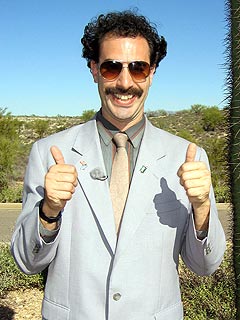
From Entertainment Weekly reporting on the Toronto Film Festival:
"But first I need to marvel at what is bound to stand as the most politically influential, most culturally important, most shockingly tasteless and most gaspingly hilarious movie of the year.
I refer, of course, to Borat Cultural learnings of America Benefit Glorious Nation of Kazakhastan, a specimen of satirical brilliance so fearless and liberatingly offensive that it ought to be included in every high school syllabus pertaining to a) multicultural sensitivity b) the craft of socially relevant comedy.
Borat Sagdiyev, the innocently politically incorrect reporter for Kazakhastan's state-run TV network who has a morbid fear of homosexuals and Jews but a virile Kazakh fondness for kissing men and wrestling with them naked is, of course, the creation of revolutionary British (and Jewish) comedian Sacha Baron Cohen; Borat's blinkered short-film investigations of the American way of life are already familiar to viewer's of Da Ali G Show. But feature-length Borat offers the happy, idiotic bigot a chance to expand the offenses he causes as he bumbles his way across our country, revealing a little more American absurdity to us with every gaffe.
Long after many of the year's more serious movies have come and gone and been nominated for this and that, Borat will stand, along with South Park: Bigger, Longer & Uncut, as one of the most incisive cultural commentaries of our era."
EW conducts an interview with Sacha Baron Cohen, in the Borat character, in which Kazakhstan's top TV reporter tells Josh Rottenberg about his upcoming movie, which is already ''blockbusterings!'' in his homeland.
Insanely offensive yet strangely lovable, faux Kazakhstani TV personality Borat, famed from Sacha Baron Cohen's hit HBO comedy series Da Ali G Show, hits the big screen with this documentary chronicle of his quest to better understand America. Here, Borat himself gives us scattered pieces of his mind. People of U.S. and A., you've been warned.
ENTERTAINMENT WEEKLY: What are some of your personal favorite movies?
BORAT: My favourites movies is Robot Cop. Womanman Doubtfire, Little Lord Fontelroy, Transsibierskiy Ekspress 2, Gerald McGuire and sex comedy The Accused.
Who are your favorite male and female movie stars and why?
I very much like Kazakh film hero Viktor Hotelier (you probably know him from blockbusters movie Almaty Summer). I also very much like the new James Bond, Roger Moore. I like female cartoon Kazakh superbhero by name ''Astounding Woman.'' She have amazing strength that she use to pull a full-sized plough for up to 42 hours without food or water.
As a TV journalist, which American TV journalists do you admire most and why?
I like very much Barbara Walters. She is unlike any Kazakh woman I have seen, she have no hair on her face or chest, and her teeth grow only on inside of her mouth.
What is the biggest difference between working with a major Hollywood movie studio like Fox and working in the film and TV industry in Kazakhstan?
Kazakh films is more realistics. In Hollywood movie The Gladiator, it obvious the tigers was not actual eat those criminal, whereas in Kazakh movie Angry Snakes on a Gypsy Boat, over 85,000 extras was actually attacked and finished by the pythons. I think Hollywoods can learn from this and be prepare to spend extra money for make movies look real.
Also rating system of two countries is a slight different. In my country you must be at least 18-year-old for watch scenes containing uncaged women, and for view explicit sexytime you must be at least 3.
What do you think the people back home in Kazakhstan will think of the movie?
This movie have already been release in Kazakhstan and was blockbusterings! It open simultaneous on all seven of our country's screens and take top spot from Hollywood movie King Kong — which had been number one in Kazakhstan since it was release in 1933.
What would Americans be most surprised to learn about life in Kazakhstan?
That it actual very modern country that have many things similar to U.S. and A. For examples, we have event exact the same as your Super Bowls — only slight difference is, instead of 80,000 sportfans who gather in arena, it is 100,000 shepherds who come down from the Tinshein Hills and gather in field and when they get there instead of look on footballs game, they drink fermented horse urine and then dig a big hole and fill it with dogs and Uzbekis and then throw potatoes on them for two days. Then they eat a soup made from spicy vegetables and then return to the hills.
We also have daytime game shows very like your Jeopardys — our most popular one have name ''Gypsy Bingo'' where we put numbers on back of 20 gypsies. Contestant have to bet on which number will manage to reach other side of minefield.
I would like invite people who read this to come visit Kazakhstan. It now democratic, free nation, with cleanest prostitutes in all of Central Asia (except of course for Turkmenistan's). Also it have world-class shopping at new supermall ''Almaty Shop City,'' which is actual built on three levels! They connected by Central Asia's first electric staircase (which did NOT swallow and grind those two schoolchildrens).
How do you think being a movie star will change your life? Are your friends and family afraid you'll ''go Hollywood''?
I do not think this a problem as I already number four most famous person in Kazakhstan behind our glorious leader, Premier Nazarbayev, pop star Billy Sexcrime, ex-Olympic gymnast Lily Utmarkan (she now work in Kazakh State Circus, where she famous for putting one foot in mouth while other is in her [CENSORED BY KAZAKHSTAN BUREAU OF COMMUNICATION AND FOREIGN AFFAIRS]) — and acting chimpanzee ''Jonny the Monkey'' (he dress like Humphrey Bogarts and smoke cigarette, but very sadly he recent die making monkey Evel Knievel movie. He was intend to jump swimming pool on motorcycle, but he crash in water and drown because his hands had been glued too strong on handlebars. Goodbye, Jonny — we miss you).
If you could bring one thing from the U.S. back to Kazakhstan, what would it be and why?
I would like bring back all the best friends I make on my travels. I like you very much. Please call me in Kazakhstan and we will make chitchat on telephones. My number is Kazakhstan 142. Chenquieh.

In English, the word ''frak'' means...absolutely nothing. But in the not-so-faraway fantasyverse of Battlestar Galactica — Sci Fi Channel's critically exalted reboot of the 1978–79 TV series about space-faring humans fleeing genocidal robots known as Cylons — ''frak'' is similar to a certain FCC-unfriendly epithet that also begins with f and ends with k. Judging from a recent visit to the show's Vancouver set, the multipurpose word will be heard frequently when Galactica returns for its third season on Oct. 6 at 9 p.m. It will be used to express angst when married military man Lee ''Apollo'' Adama (Jamie Bamber) finds himself yearning for married fighter pilot Kara ''Starbuck'' Thrace (Katee Sackhoff) and mutters ''Frak me.'' It will be used to express awe once chief mechanic Gaelin Tyrol (Aaron Douglas) discovers a secret saloon inside the titular battleship and marvels, ''Holy frak!'' And it will be used to express rage after a high-ranking officer (nope, we ain't tellin') drives a pen into the neck of tortured traitor Gaius Baltar (James Callis) and screams ''MOTHERFRAKKER!''
Yep: There sure is a lot of frakkin' human drama on this sci-fi show. Sometimes there's more of it than there is actual science fiction — and that's exactly how they like it in Galactica's little corner of the cosmos. To be certain, the show has its fair share of far-out bits, like visually stunning F/X, trippy concepts (a half-Cylon/half-human baby whose blood has cancer-curing powers), and, of course, Number Six (Tricia Helfer), an immortal platinum blond Cylon partial to wearing crimson red dresses and high heels. But more than that, the show has distinguished itself as one of television's very best dramas — on a par with 24, The Wire, and Lost — because it so utterly transcends both its genre and its source material.
The original ABC series was a one-season wonder of Star Wars-era escapism that over time has attracted a nostalgic, multigenerational cult following. But this gritty new version has taken the same bleak conceit of its predecessor — the unceremonious obliteration of humanity on the peaceful planet of Caprica by cybernetic invaders — and rewired it with prickly, challenging post-9/11 relevance. No longer are the Cylons chrome-plated toasters with oscillating LED eyes — they've evolved into flesh and blood, which allows them to hide in plain sight, like, say, as a muckraking journalist (D'Anna, played by Lucy Lawless). Moreover, they're now motivated by their radical belief in one God to wipe out their creators from existence. Fortunately, the Capricans are as resilient as cockroaches.
Exactly 50,298 surviving souls soon boarded a fleet of star cruisers — led by the massive battleship Galactica — and embarked on a possibly fruitless quest for a mythical lost colony called Earth. They were led by Adm. William Adama (Edward James Olmos) and President Laura Roslin (Mary McDonnell), along with ace fighter pilots Apollo and Starbuck; once-trusted pilot — and Cylon sleeper agent — Sharon Valerii (Grace Park); and the brilliant but slightly mad scientist Baltar, whose feverish visions of Number Six propelled his unlikely ascension to the presidency in season 2. That disastrous development only led to more problems once the refugees found a home on the barren planet of New Caprica; by the finale, their bid for a new beginning came to an end when the Cylons returned.
For nonviewers, this may induce a massive headache. But the series' sophisticated stories have also attracted a distinctively new breed of fan, one who's not necessarily a sci-fi buff. ''Some of the smartest people I know are addicted to this show,'' says McDonnell. ''All it takes is one or two episodes and you're hooked.'' Though routinely snubbed by the Emmys (yeah, it stings them), Galactica recently won a prestigious Peabody award, and the affirmation has the cast and crew psyched. ''The last thing that I wanted to be doing was science fiction on cable television,'' says Olmos. ''But this, to me, is a real gift. I'll be in science fiction every day of my life if they can give me this kind of drama.''
Now, if only they could give him a bigger audience. Galactica averaged 2.3 million weekly viewers in season 2, and while that's impressive by Sci Fi's standards, conventional wisdom says its ratings could — and should — be much larger. Blame the complicated plots and the genre's fringy rep, a stigma that's only exacerbated by a glut of similar-sounding (and inferior) shows like Stargate Atlantis, Farscape, and Andromeda. Says Callis: ''It's strange to exist in the popular consciousness, but so few people actually watch the show. I can't tell you how many times I've had to tell people, 'No, we're not Stargate. Really.'''
''Our name has always been a blessing and a curse,'' says exec producer Ronald Moore. ''Now it's really a curse. We've done market research. People who would watch Nip/Tuck, The Shield — that's our audience. But the minute you say Battlestar Galactica, you can see the lights go off in their eyes.'' Adds Park: ''I can't even get my agent to watch the show. I appreciate your laughter, but it's true. Sooooo true.''
And yet. Mounting buzz and fan-generated ardor have raised hopes that a giant leap forward in popularity is at hand. At the same time, the show is about to make some of its riskiest moves yet. In a strategic shift, Galactica will return in early October — not during basic cable's usual summer-launch season — but for the first time against the broadcast networks' big guns. ''Moving to fall isn't going to hurt,'' insists Sci Fi president Bonnie Hammer. ''With the right product, we can go toe-to-toe during network season. And we truly believe Battlestar Galactica can do it.''
But this is its third season, a critical time when even the best TV series start to struggle with maintaining their creative vitality. So Moore and coexec producer David Eick are, ironically enough, ramping up some of those allegedly alienating sci-fi elements for season 3, which features an exploration of Cylon society via an extended stay inside one of their base ships. Eick, naturally, feels compelled to share some jumping-the-shark anxiety here at the moment of Galactica's breakout opportunity. ''We approach season 3 with nothing but terror, insecurity, and sheer liquid horror that we're going to screw it up if we're not really, really careful,'' he says. ''That's our mantra: Don't screw it up.''
Then again, it seems that Battlestar Galactica has actually done pretty well for itself by trying to steer prospective viewers in the other direction. When Sci Fi relaunched the franchise with a 2003 miniseries, there was certainly a ragtag band of enthusiasts — including original star Richard Hatch — clamoring for it. Since 1998, Hatch had led a charge to get Galactica's copyright owners to resume the saga via a new show. He nearly got his wish: In 2001, a concept developed by director Bryan Singer and his X-Men producer Tom DeSanto for Fox focusing on a new generation of Galactica denizens imploded after delays infringed upon Singer's commitment to X-Men United. Enter Sci Fi — and exit the whole ''continuing the saga'' idea. The network instead optioned the property with the intention of ''reimagining'' the franchise — same characters and concept; different actors and aesthetic approach — and hired former USA Cable exec Eick. He, in turn, snagged Moore, well-known in sci-fi circles for his years as an acclaimed writer and producer in Paramount's Star Trek factory. Neither man had any nostalgia for the original series; to this day, Eick still hasn't watched the entire pilot.
The faithful got their first glimpse of Galactica 2.0 at a 25th-anniversary convention organized by Hatch at a Hollywood hotel. Reports of Moore's revisionist plans had already reached and irked fans (Starbuck's now a chick?! Heresy!), so Hatch invited him over to respond to his critics. Moore accepted, and even brought clips from the still-in-production miniseries. The reaction: boos, hisses, even threats of popcorn throwing. ''At one point,'' recalls Moore, ''they asked me, point-blank, 'Will you pledge to make a different show if this goes to series?' And I said, 'No.'''
And you know what? Those angry fans all probably watched anyway: The miniseries garnered promising ratings for Sci Fi, and the series launched in January 2005 (though not until a foreign partner was recruited to help underwrite the costly enterprise). This version still has its dissenters; you can Google ''Galactica in name only'' to sample their vitriol. Most of their fury is still directed at the now-female Starbuck. Her sex change rankled diehards because of affection for original portrayer Dirk Benedict (who reportedly was going to reprise his role in the Singer/DeSanto version), and because it represented the death of a dream: to see a continuation, not a revamp, of the saga. ''At first, it totally sucked,'' says the new Starbuck, Sackhoff, of the derision. ''There were petitions on the Internet to, like, save Starbuck's genitalia. I started becoming obsessed. I'd be up until 2 a.m. after every episode, trying to figure out if I won them over. And because it takes 100 positive remarks to let go of one negative comment, I would be going, 'Okay, one more positive, one more positive… S---! It's a negative!' I was like, I've got to stay off the Internet.''
For his part, Hatch thinks they just need to get over it. ''The miniseries was very hard to watch for the original fans, and for me, not because it wasn't wonderful, but because it was so different,'' says the actor, who has a recurring role on the new Galactica as a political dissident-turned-leader. ''It's the same thing as life: We grudgingly yield to change, and ultimately realize that change is good. This Battlestar has balls. It has guts. It digs more deeply into the premise than the original ever could.'' Under Moore and Eick's watch, Galactica has thus become a TV think piece teeming with politically potent issues. Moore said he felt the very premise — a society is devastated and transformed by a catastrophic terrorist attack — demanded that the show's fiction speak to our post-9/11 environment. Embracing the opportunity, they resolved that Galactica ''was going to be about us,'' says Moore, ''about the experience that we're having right now.'' He and Eick praise Sci Fi for the freedom they've been given, although their penchant for coloring heroes with disturbing moral ambiguity (Starbuck brutally torturing a prisoner; Adama drowning a baby in a dream sequence) has sparked some clashes with network brass. ''They could be a wee bit more hopeful and aspirational,'' says Hammer. ''But it's a huge learning curve, and they're finding the right balance.''
Still, don't expect the bleak skies to clear up completely. The fleshbots may have again found their targets, but they're increasingly conflicted over their genocidal policy: They've set up Baltar as a puppet leader, and are making the New Capricans live under their boot instead of crushing them with it. Galactica's geopolitical touchstone, meanwhile, has shifted from Patriot Act America to occupied Iraq. As such, the rooting interest for viewers has become murkier. In the season premiere, for instance, human insurgents make a shocking choice to employ suicide bombers. For the actors, bringing to life this juicy dilemma was a mixed blessing. ''I was thrilled by the possibility of taking people that we know and love and seeing them put in a circumstance where anyone can become [someone] they don't want to be,'' says McDonnell. ''Shooting that particular episode, everybody looked sad, everybody felt sad. We realized we were all sort of going through the same thing: the hopelessness of an occupied nation.''
If relating to an oppressed people was rough for the cast, venturing behind the iron curtain of Galactica's oppressors was just plain weird, and not everyone believes that getting to know the Cylons is a good idea. ''My personal jury is still out,'' says Bamber. ''I think where the show really works is in the daily grind aboard the Galactica, trying to run from this unknown and therefore ultimately terrifying enemy.''
The encouraging news is that the creative gambit has been given considerable thought. To prep the Cylon actors, Moore wrote a veritable Cylon manual called ''Life on a Base Ship.'' ''It was like gold,'' says Helfer, who declined to divulge any nuggets. ''But I did share it with other actors who didn't get copies. Not any humans, mind you, just my fellow Cylons.''
For all the hand-wringing, Hammer believes the Cylon plotline enriches the provocative question at the center of season 3's stories: ''How do you know which side you should root for?'' She hopes Galactica's audience can grow this season; if it doesn't, its current ratings and network-enhancing reputation — combined with ancillary revenues from DVD sales and the hugely popular original webisodes that have netted 1.8 million downloads since launching earlier this month — still make it a very valuable asset. Sackhoff puts it in perspective: ''The show is good because we're on a smaller network that allows us the freedom to take chances. I don't know if this show could go mainstream, and if we'll get any bigger than we already are. Let them have their Grey's Anatomy, you know? We'll keep our secret to ourselves until it's time to give it up and move along.''
Like the original Galactica, this version has an implicit conclusion: the eventual discovery of Earth. Moore and Eick say they have an ending in mind, but won't say if it involves the Galactica and its fleet actually reaching our fair planet. Ask the cast, and they'll tell you (after insisting that Galactica is really about the journey, not the end...blah blah blah) about a popular joke on the set: The series' climactic scene will find the fleet being blown to bits by America's president. ''You know it's never going to end happy,'' teases Park. ''They think Earth is this magical Eden, but we all know how we treat each other here. Then again, you know the Cylons are just going to follow them to Earth and bring their little war to our backyard. So maybe it would be better all around if [the American president] ordered a nuclear strike on Galactica. That would be like the biggest 'F--- you.''' Or frak you, as it were.
Battlestar Galactica returns to the Sci-Fi channel in early October.
They gave their lives

I don't know why this touching tribute to all the American women who died in armed conflicts, really touched me.



















